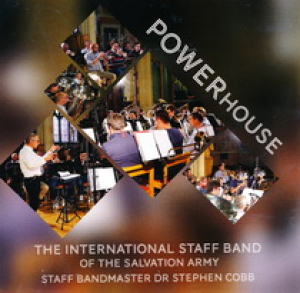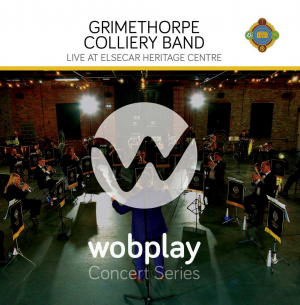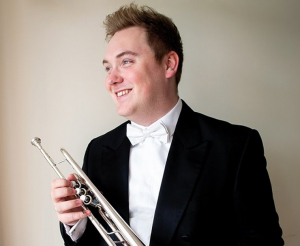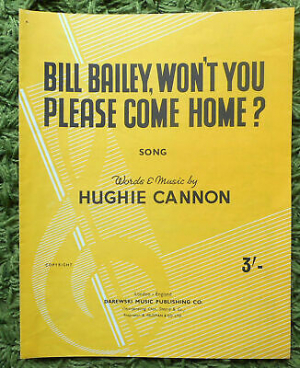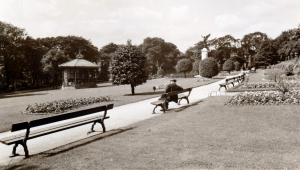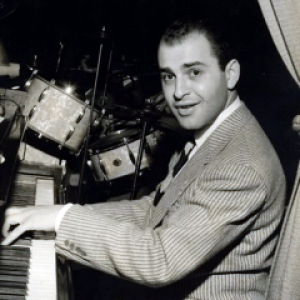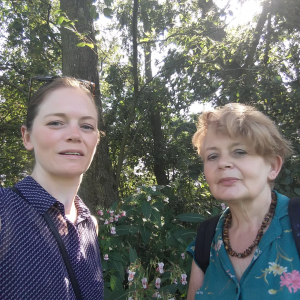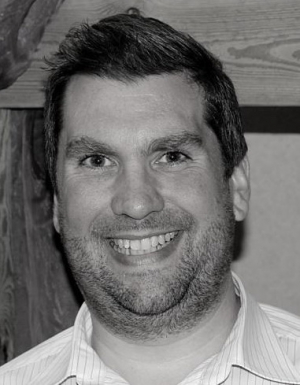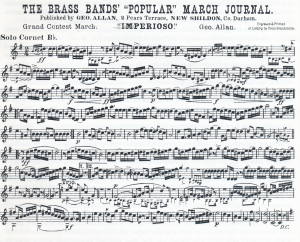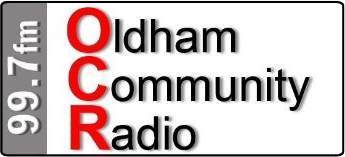
Talk Subjects
Chris Helme
Formed in 1917, during the First World War, Grimethorpe Colliery Band is a British institution. National and British Open Champions on numerous occasions, the band’s contest successes remain legendary. These include 16 Brass In Concert Championship titles, 11 times Yorkshire Regional Champions, two English National Championship victories, four times British Open Champions and four times National Champion Brass Band of Great Britain.
Grimethorpe's diverse noted concert performances include those at the FIFA World Cup, BAFTA Awards, BBC Proms, Eurovision and London 2012 Olympic Games Opening Ceremony, together with a wealth of national and international television / radio appearances and professional recordings. The band has been the recipient of two gold discs, as well as a BAFTA nomination for its contributions to the global hit movie “Brassed Off” for which Grimethorpe was the focal point.
“Tompkinson, Postlethwaite and Carter are stand-outs in an impressive ensemble cast, but for many, the brass band music of Grimethorpe comes as the real revelation” - Time Out
The Royal Albert Hall, Symphony Hall, Barbican, Westminster Abbey, European Parliament, Sydney Opera House and more, have all played host to Grimethorpe. With tours to Australia, Hong Kong, Japan, New Zealand, and concerts & festival appearances throughout Europe, the band’s performance reputation remains unsurpassed.
“A thoroughly entertaining show & a must for all music enthusiasts” - The Guardian
In addition to continuing to delight audiences across the globe, Grimethorpe also continues to invest in and support its local community in Grimethorpe, Barnsley and South Yorkshire, particularly through its youth music initiatives and community performances, both locally and on a national scale.
We are featuring Grimethorpe on this week';s show with a track from the band's latest CD.
Enjoy
The newest member of the London Symphony Orchestra is trumpet player James Fountain. As the LSO Principal Trumpet he is following in the footsteps of some of his brass playing heroes.
He grew up surrounded by music with both his parents in the local Salvation Army band. He first picked up the cornet at the age of three, as a youngster he played with his local band the GUS Band, The National Youth Brass Band of Great Britain and then the Grimethorpe Colliery Band. He was Principal Trumpet at the Royal Philharmonic Orchestra whilst still studying and also held the same position with the London Philharmonic Orchestra.
James has always been inspired by the level of musicianship in London and feels very fortunate to have played with so many fantastic players during his career so far. One of his most important brass playing icons is Maurice Murphy, former Principal Trumpet at the London Symphony Orchestra.
James is featured on this week's show with a track from his new CD.
Pimpanit Karoonyavanich was born in Bangkok, Thailand in 1988. She started her first piano lesson at the age of eight and joined her school’s choir at the age of 11. Since then, until high school graduation, she had shown great interests in music by engaging in singing activities, playing accompaniments, giving concerts, and joining choir competitions in Asia and Europe.
Having explored the world of music during her high school years, she decided to pursue her undergraduate degree in Piano Performance at Kasetsart University, Bangkok and graduated in 2010.
In 2011, she began her music education in Belgium with Prof. Wim Henderickx at The Royal Conservatory of Antwerpen. The following year, she began her lessons with Prof. Jan Van der Roost and Prof. Luc Van Hove at Lemmens Institute (LUCA School of Arts) until she graduated her master’s degree in music composition in 2015.
During her years as a composition student, Pimpanit’s interests in conducting was evoked by Prof. Jan Van der Roost. Consequently, she decided to pursue her undergraduate degree in Conducting taught by Prof. Ivan Meylemans at Lemmens Institute (LUCA School of Arts) and graduated in 2016.
Pimpanit was assigned to write the test piece for Dutch National Brass Band Championships 2017 – 3rd Division. This work “A Journey to the Bermuda Triangle” was also used as the test piece for Belgian National Brass Band Championships 2017 – 3rd Division. Following this composition she was nominated by 4barsrest (4BR Awards) as 1 of the 10 “2017 Newcomers of the Year”.
Her composition works for concert band, brass band and fanfare band are published by the music publisher “BVT Music GCV” https://www.bvtmusic.be/en and have been performed internationally in countries such as Thailand, Belgium, Russia, Germany, Italy, United States, Netherland, Lithuania, Japan, England, Wales.
We are featuring The Journey to the Bermuda Triangle on this week's show.
Hugo Cannon (Hughie) (April 9, 1877 – June 17, 1912) was an American songwriter and pianist whose best-known composition was the popular ragtime song "(Won't You Come Home) Bill Bailey".
He was born in Detroit, Michigan and began performing with Barlow's Minstrels in the 1890s, as a singer, dancer, and pianist, often working with actor John Queen and had several songs published. He occasionally worked as a bar pianist in Jackson, Michigan, where he met local musician Willard "Bill" Bailey. On one occasion in 1902, Bailey was talking to Cannon about the state of his marriage to Sarah. He was inspired to rattle off a ditty about Bailey’s irregular hours." Bailey liked the song, but his wife could not see the humour. Cannon sold all the rights to the song to a New York publisher. The tune is similar to an earlier song he wrote that was credited to Queen and Walter Wilson.
He died penniless aged 35 at the Lucas County, Ohio, Infirmary. The cause of death was cirrhosis of the liver. He was interred at Hill Grove Cemetery, Connellsville, Fayette County, Pennsylvania, USA. https://www.findagrave.com/memorial/8324/hughie-cannon
David Mann (October 3, 1916 — March 1, 2002), also known as David Freedman, was an American songwriter of popular songs. His best-known songs are 'There! I've Said It Again' (1945), popularised first by Vaughn Monroe and later by Bobby Vinton, 'No Moon at All' (1947), recorded by Robert Goulet in (1963) and 'In the Wee Small Hours of the Morning' (1955), recorded most notably by Frank Sinatra, but covered by many other artists over the decades.
One of Mann's hits 'There I've Said it Again'—the Bobby Vinton version of 1963—was the last number one in the United States before the British Invasion. It was knocked off the top spot by The Beatles' song 'I Want to Hold Your Hand'. Thereafter, his song writing career came to and end and for the next 32 years he was a journalist until his death.
His most enduring composition was ‘In the Wee Small Hours of the Morning’, written with Bob Hilliard. The song has over 500 cover versions to its credit, over 100 available today on iTunes. The song enjoys wide acclaim, and the Sinatra album has been considered the first 'concept album'. We are featuring this song which is now a popular trombone solo and has been both played at concerts and recorded many times.
David Mann died in March 2002 from complications due to pneumonia and kidney failure.
I was born in the house of my na-na (my mothers’ mother) at 1, Crow Nest Cottages, Lightcliffe. Later my parents moved to 20 Ripley Street, Lightcliffe. Granny lived at Hill Top, Lightcliffe.
From graduating in 1998 at Kingston University with a BA Hons in Music, Dean Jones has been writing music for publishers ever since.
With now over 200 publications at present to his name and compositions on numerous CDs and DVDs, Dean has enjoyed a successful decade as a frequent contributor of both instrumental and vocal music for artists and publishing houses across the globe.
His piece for brass band entitled Glorifico Aeternum (2003) was performed at the Royal Albert Hall, London in July 2004 and since then, it has been performed in major concert halls around the world.
Supremacy (2006) was the title track of the International Staff Band’s CD recording in 2007 and pieces such as El es El Senor, Faithful God, Processional and Night before Battle, have also proved popular in the brass band repertoire.
Two recent major works, Validus Deus and Vista were recorded by the North York Temple Salvation Army band and featured during their UK tour in May 2013. In September 2014, it was a great privilege for Dean to have his test piece An English Pastorale announced as a Regional Brass Band Championships set work for the 4th section contests in 2015.
The Royal Albert Hall was again the scene for two brand new works at ‘Christmas with the Salvation Army’ in November 2014, – ‘A Christmas Fanfare’ for Cornets and Trombones, and an original setting of ‘O Holy Night’ for vocal soloist Stuart Pendred with the backing of full brass band, two choirs and pipe organ.
On show we are featuring Dean’s Glorifico Aeternum played by the Household Troops Band of the Salvation Army conducted by Major John Mott in 2008. from the CD Trailblazers.
The featured image this week is a facsimile of George Allan's contest march 'Imperioso'. Whilst not one of his most favoured marches it would certainly test many bands at any of the annual Whit-Friday contest marches.
George Allan: The March King of the North of England
The featured image this week is a facsimile of George Allan's contest march Imperioso. Whilst not one of his most favoured marches it would certainly test many bands at any of the annual Whit-Friday contest marches.
George Allan was born on March 21, 1864, and died on March 16, 1930, was a composer and arranger of music for brass bands who was born, and resided for most of his life, in New Shildon, County Durham, United Kingdom. As a composer he was a contemporary of William Rimmer and J. Ord Hume.
His parents John James Allan, a Tailor and Draper, and his wife Hannah, lived in Chapel Street, New Shildon, when their new son was born. As a youth he was a choirboy at All Saints Church in Shildon having learned to sing as a child through the Tonic Sol-fa method. His choirmaster suggested that he find out what he could learn by joining a brass band, resulting in his joining the New Shildon Juvenile Brass Band under the tutelage of Edward Dinsdale (Uncle to New Shildon's other notable composer / arranger Thomas Edward Bulch 1862–1930) and someone known to our listeners in Australia, particularly in New South Wales.
He initially learned to play baritone, before gradually progressing to become a solo tenor horn player. He was eventually promoted from the juvenile band into the senior New Shildon Saxhorn Band, under bandmaster Francis Dinsdale (Grandfather of Thomas Bulch).
When Francis Dinsdale relinquished the post of bandmaster of the New Shildon Saxhorn Band prior to his death in December 1884, George Allan inherited the role. This opportunity arose in part through Thomas Bulch having already become bandmaster of a breakaway New Shildon Temperance Brass Band a few years earlier.
On reaching working age he initially worked as a labourer, before taking up a post as a Blacksmith's Striker at the North-eastern Railway wagon works at Shildon, where for a short while he worked alongside Thomas Bulch before he emigrated to Australia in 1884. He was also a subscribing member of the local Mechanic's Institute which had been founded in the town by the railway pioneer Timothy Hackworth.
Between the mid-1880s and his death in 1930, George Allan composed and/or arranged a considerable repertoire of pieces of music for brass bands, with some being also published as military band arrangements that included additional reed instruments. Many of these were published initially by T. A. Haigh's 'Amateur Brass Band and Military Journal' based in Hull. Later compositions were published by Fred Richardson's 'The Cornet Brass and Military Band Journal'. This latter journal, and rights to all the pieces featured therein, were later acquired by music publishers Wright and Round who continue to publish a selection of George Allan compositions as part of their archive catalogue.
He also self-published compositions, particularly in later life from his home at 2 Pears Terrace, New Shildon up until the end of 1924 and then from 4 Osbourne Terrace, Leeholme from 1925 onwards; these addresses being generally always printed under the title of the piece on each sheet.
From 1896, until the year of his death, George Allan also offered his services, and was engaged, as an adjudicator for brass band contests around the North-East of England, and Southern Scotland. In July 1902, he changed occupation to that of Wagon Painter, which he maintained until his retirement in February 1925 after which he moved from Shildon to nearby Leeholme.
He was married to Elizabeth Willoughby on August 16, 1887, at St Anne's Church, Bishop Auckland. The couple had three children: Beatrice, William Willoughby, and Lillie. Elizabeth passed away in August 1911 leaving George a widower. He did not remarry.
Between 1917 and 1929, he was the conductor of the orchestra for the New Shildon All Saints Amateur Operatic Society.
He died March 16, 1930, and was interred alongside his wife in the churchyard at All Saints Church in Shildon. A commemorative stone was unveiled opposite Shildon's town square during the 1970s.
During his lifetime, George Allan wrote at least 70 marches, as well as some concert pieces and pieces of dance music. He is best known today for his contest marches (pieces designed to show every section of a brass band at its best) a number of which continue to be played. These include Knight Templar, Senator and The Wizard.
Other works included:
- Battle Abbey - (march)
- Belle of Bohemia - (waltz)
- Belmont - (contest march)
- Binchester - (march)
- Blytheville - (march)
- Boscombe - (quick march)
- Bravura - (contest march)
- Cavalier - (overture)
- Collier, The - (march)
- Cyclone, The - (march)
- Darlington - (march)
- Diomed - (contest march)
- Diplomat, The - (march)
- Elmville - (march)
- Everest - (contest march)
- Florence - (quadrille)
- Gabriani - (overture)
- Gale, The - (contest march)
- Granville - (march)
- Imperioso - (march)
- Impetus - (march)
- Jupiter - (march)
- King Edward - (overture)
- Knight Templar - (contest march)
- Lefebvre - (contest march)
- Lonsdale - (march)
- Lunedale - (march)
- Lyndhurst - (march)
- Nevada - (waltz)
- New Century, The - (fantasia)
- Niobe - (march)
- No Retreat - (march)
- On Parade - (march)
- Pendragon - (march)
- Penelope - (set of waltzes)
- Phantom - (march)
- Raby - (march)
- Red Cross, The - (fantasia)
- Repulse, The - (march)
- Romola - (overture)
- Royal Festival - (fantasia)
- Runaway - (galop)
- La Rustica - (overture)
- Rusticus - (fantasia)
- Senator - (march)
- Shawville - (march)
- Silverdale - (march)
- Silver King - (march)
- Sons of Toil - (march)
- Storm Fiend, The - (march)
- Ovation, The - (march)
- Village Feast, The - (fantasia)
- Vigilant - (march)
- Wanderer, The - (march)
- Waverley - (march)
- Windlestone - (march)
- Wizard, The - (march)
- York - (march)
On this week's show we are featuring bands and soloists from around the brass banding world. If you have a request or a question about the world of brass bands you can contact me at This email address is being protected from spambots. You need JavaScript enabled to view it. I will be pleased to play it for you and share it with our worldwide audience.
www.chrishelme-brighouse.org.uk
Happy new year and enjoy the show...
Talks Available
All the presentations are timed to last up to an hour except where shown - questions are gladly taken after the presentation. All have been presented to male, female and mixed audiences of varying age groups.
-
A Postcard from the Past
The Sunny Vale Pleasure Gardens, Halifax - Yorkshire’s Alton Towers of the…
-
All in a Days Work
Reminiscences from 30 years in the Police Service – (humorous lecture presentation)…
-
Legends from the world of Brass Bands
(Info-tainment – digital slides & music) – 1 hour presentation.
-
A Week in May
A story based on the Murder of Lord Frederick Cavendish (of the…
- Memories of Christmas Past
-
The Road to Publication
In 1979 I was asked to assist in presenting a series of…
-
How we used to live
We have all seen and experienced changes in our lives. Bring back…
- Holiday Memories from the Past
-
Other Folks Rubbish (Not suited to a Zoom presentation)
With a local history theme… – (thought provoking humorous lecture presentation) –…
- So you want to be a Pirate ? - The life of a Pirate was not all that it seemed
- Superstitions, New Year Resolutions and the Origins of St Valentine's Day
- Brighouse at Work
-
Sorry but I am not able to accept any more face to face talk bookings at the present time ONLY ZOOM TALKS


